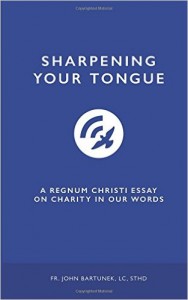 Social Media often desensitizes us to sins of the tongue. If everyone else is using swear words and insults against politicians, my mean comment doesn’t seem that negative. But as Christians we are not just called to be better than average, we are called to be saints.
Social Media often desensitizes us to sins of the tongue. If everyone else is using swear words and insults against politicians, my mean comment doesn’t seem that negative. But as Christians we are not just called to be better than average, we are called to be saints.
Sharpening Your Tongue by Fr John Bartunek speaks to this need to use our tongue virtuously. I picked it up to review. Overall I’d give it 5/5 stars.
Fr Bartunek doesn’t say anything radical and earth-shattering that I hadn’t already heard, but he summarizes all the aspects of sin and virtue with the tongue in only 37 pages. Let me summarize his argument then give my assessment.
Fr John begins by reminding us how “Our ability to communicate through language [is] connected to being created in [God’s] image and likeness.” (2) This is why how we speak is so central to Christian virtue and to the Regnum Christi charism. He then moves on to a biblical perspective focusing on the psalms and Jesus’ discussion with the Pharisees. Fr John quickly points out what makes up a lie according to the catechism and then moves on to what he calls “the normal temptations” which are sins of the tongue we are probably all tempted to do multiple times a day. These include rash judgment, calumny or slander, flattery or adulation, detraction, irony, boasting, destructive criticism, and whining. Finally, instead of listing the virtues that we practice of the tongue, he focuses on principles for the virtuous use of the tongue such as conviction, vulnerability, silence, listening, and conversing.
He clearly points out the nature of each vice, gives some examples, and offers means to fight it. For rash judgment, the definition comes from of the Catechism, “Assuming as true, without sufficient foundation, the more fault of a neighbor.” (CCC 2477) He then gives it the example of seeing what appears like a car being stolen and guessing the thief’s motives. He concludes by pointing out that this isn’t assuming no one ever sins but “Keep[ing] the circle of judgment open, to let God alone be the judge of the whole interior world of hidden motivations and moral culpability.” (13-14)
He also points out obstacles to healthy communication. For example, “Speaking from the heart, for my deepest convictions, often requires a willingness to be vulnerable. But it also requires having deep convictions.” (31) We need both vulnerability and convictions to begin the dialogue.
The only defect I saw was that on a few occasions, I said to myself “Where’s the rest?” as I was hoping for a little bit more explanation. Maybe that’s what each of us in Regnum Christi is supposed to work out in our life.
We need a razor-sharp intelligence and wit to use the tongue effectively but a razor-sharp tongue will lead us to fall into the sins of the tongue. Hopefully this essay will help you develop a razor-sharp mind while dulling your razor-sharp tongue.
Disclaimer: I got a free review copy for my honest opinion.
